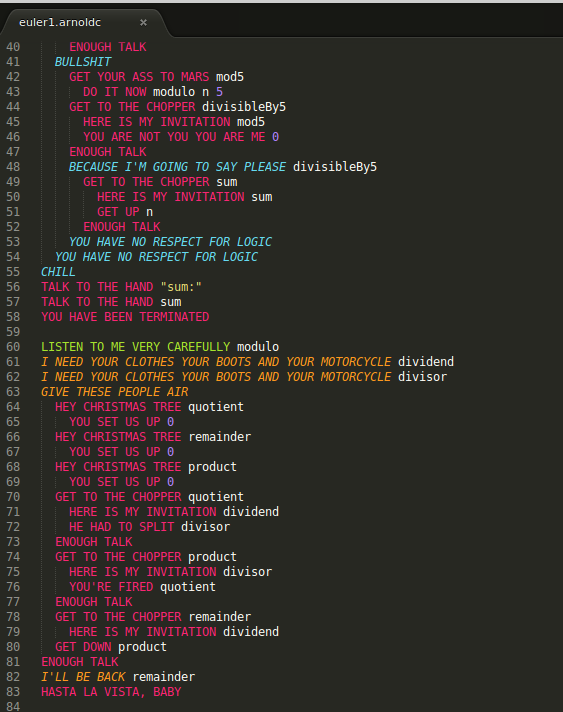I came up with my own esoteric language,
HashQ. Here's how it works:
Each program has its own register, which it can add to, remove from, and reset. Each program can also input to and output from said register. Registers hold characters (C# chars) and, when the program is started or the register is reset, it is a null character ('\0').
Sample Program
Here is a simple "Hello, World!" statement:
Code:
++++++++++++++++++++++++++++++++++++++++++++++++++++++++++++++++++++++++=#++++++
++++++++++++++++++++++++++++++++++++++++++++++++++++++++++++++++++++++++++++++++
+++++++++++++++=#+++++++++++++++++++++++++++++++++++++++++++++++++++++++++++++++
+++++++++++++++++++++++++++++++++++++++++++++=#+++++++++++++++++++++++++++++++++
+++++++++++++++++++++++++++++++++++++++++++++++++++++++++++++++++++++++++++=#+++
++++++++++++++++++++++++++++++++++++++++++++++++++++++++++++++++++++++++++++++++
++++++++++++++++++++++++++++=#++++++++++++++++++++++++++++++++++++++++++++=#++++
++++++++++++++++++++++++++++=#++++++++++++++++++++++++++++++++++++++++++++++++++
+++++++++++++++++++++++++++++++++++++=#+++++++++++++++++++++++++++++++++++++++++
++++++++++++++++++++++++++++++++++++++++++++++++++++++++++++++++++++++=#++++++++
++++++++++++++++++++++++++++++++++++++++++++++++++++++++++++++++++++++++++++++++
++++++++++++++++++++++++++=#++++++++++++++++++++++++++++++++++++++++++++++++++++
++++++++++++++++++++++++++++++++++++++++++++++++++++++++=#++++++++++++++++++++++
++++++++++++++++++++++++++++++++++++++++++++++++++++++++++++++++++++++++++++++=#
+++++++++++++++++++++++++++++++++=#
As you can see, it's pretty complex, but looking at it, it's rather simple!
Let's look at the first line:
++++++++++++++++++++++++++++++++++++++++++++++++++++++++++++++++++++++++=#++++++
If we ignore the last few plus symbols on the end, it becomes:
++++++++++++++++++++++++++++++++++++++++++++++++++++++++++++++++++++++++=#
The plus symbols represent an ASCII character - in this case, the number of pluses equates to the ASCII decimal position. There are 72 plus symbols, meaning that it's the letter H.
The equals symbol then outputs this character, and the hash symbol resets the register to a null character.
This continues throughout the code, changing the number of pluses each time to create the string "Hello, World!".
Current Features
Here's what you can do currently:
+ increment register
- decrement register
= output from register
_ input to register
# reset register to null
Planned Features
At some point in the future I'll add support for if statements, which will look something like this:
[_'A']+[!]#;
This will collect input (the underscore character) and if it's the letter 'A', it will add to the register. Otherwise, it will reset the register! The semicolon at the end denotes the end of the if statement.
I might also add while loops, adding support for simple echo programs, for instance:
[/T]_=#;
This will take input, output it and reset the register while (/) true (T).
This will involve implementing true and false booleans (T/F respectively).
Interpreter
Here's a link to the current version of the HashQ Interpreter (v1.1):
https://mega.nz/#!4dIDAaDJ!8hIqq5_kjO75AN4OA2mdEfrpp9-goQgFv8ROE7-ZG5k



